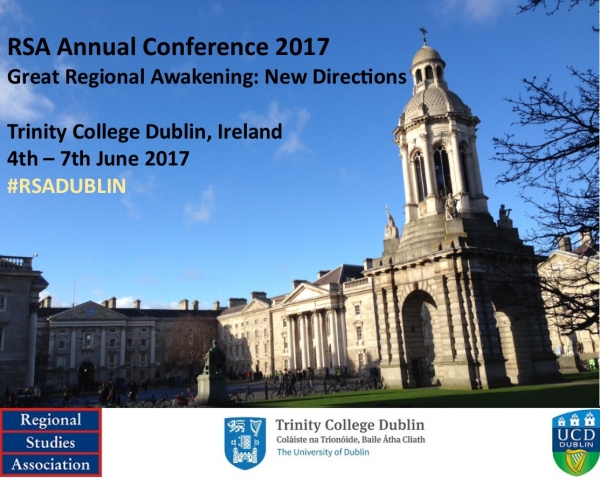A group of IMAJINE researches have organized a session at the Regional Studies Association (RSA) Annual Conference – The Great Regional Awakening: New Directions, held between 4th and 7th of June 2017 at Trinity College in Dublin, Ireland.
Session was entitled “Spatial justice and territorial cohesion”, while the organizers came from two universities: National University of Ireland Galway – NUIG (Marie Mahon, Patrick Collins, Maura Farrell, John McDonagh), and Aberystwyth University – AU (Michael Woods).
This session seeked to explore the concept and dynamic of spatial justice as it pertains to the level of the region in development terms. In the EU context, this regional perspective on spatial justice has conventionally been understood as a drive towards territorial cohesion, identified as the achievement of economic convergence based on measures such as GDP that popularly underpin EU cohesion policies. However, with the evidence for widening disparities between the regions the contention is that the concept of spatial justice has tended to be applied as a limited form of analysis of regional inequalities at national and EU level. The use of GDP as a main measure of uneven economic development, the evident contraction of public resource and service distribution, the failure to recognise and react to the spatial politics of the recent economic crisis and subsequent austerity policies reveals an approach to territorial cohesion that falls well short of what spatial justice as a concept is seen to denote.
This session invited papers that deal with this question of spatial justice, territorial cohesion and sustainable development in the EU context. Potential themes could include (but not limited to):
– The relevance of content- and value-led concepts of spatial justice;
– The problems of a predominantly global and urban focus in studies of spatial justice;
– Policy formulations that have transferred spatially unjust impacts in terms of distribution of and access to resources, services, environmental quality, and wellbeing;
– The scope for contestation, and for alternative models of governance to tackle inequalities;
– The exploration of inequalities as a function of the socially-constructed nature of space, and the ways in which this may open up possibilities for reconfiguring social, economic and political relations as new and more enduring forms of interconnection, interdependence, and solidarity;
– Evaluations of inequalities, policies, and instruments that incorporate normative values of fairness and justice.
During the session, above mentioned team from NUIG presented a paper entitled “Local experiences of spatial planning; a spatial justice interpretation”.
Here you may read the abstract of this paper:
Preparations are underway for a new Irish National Planning Framework (NPF, 2017-2040) to replace the failed National Spatial Strategy (NSS) 2002-2020. Emphasis is being placed now on interconnecting spatial planning and sectoral policies, on processes of decision-making that are hierarchical but attuned to the place-specific nature of regional- and local-level development prospects and capacities required to achieve same, and on mobilising communities as the nucleus of place. In the most recent (February 2017) NPF draft document, no explicit reference is made to spatial justice as a desired dimension of spatial planning. There is, however, considerable discussion on the significance of links between spatial planning and outcomes for health, wellbeing and place-making. In light of this new NPF emphasis on achieving potential as opposed to simply growth, this paper uses an example of a settlement in the hinterland of Galway City and draws on contemporary thinking on spatial justice to reflect on how the local population has experienced the outcomes of spatial planning decisions over the last two decades in terms of everyday lived experiences in that place, particularly following the 2008 economic crisis. It also reflects on the scope to engage in future spatial planning at this local level in ways that are politically and socially enabling; based on enhancing local capabilities rather than on distributive and compensatory forms of governance and development intervention.

